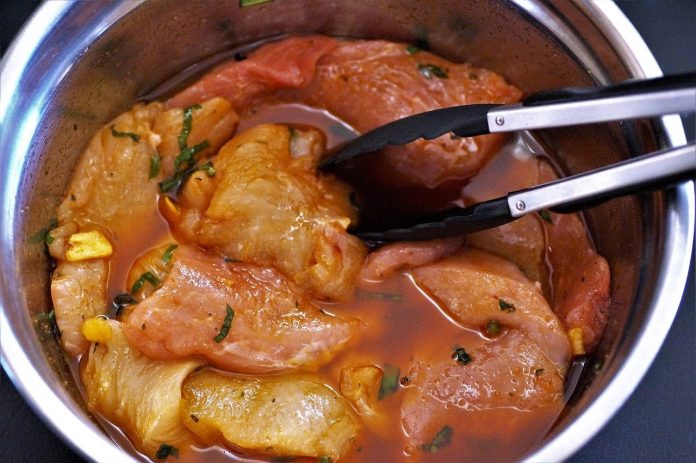Fruity olive oil, fresh herbs and a good spike of lemon are the only introductions you need to the wonderful technique of marinating. Combine ingredients, immerse meat, soak for a couple of hours and you’ve got a succulent joint or fillet imbued with another layer of subtle flavour.
Of course, this is just your starting point. Once you’re hooked on this simple method of adding lashings of flavour you won’t be able to stop yourself marinating nearly everything with nearly anything you can get your mitts on.
With a few key points and classic techniques up your sleeve, you’ll be able to effectively experiment with a whole host of interesting flavours, often most happily sourced from your own garden or the back of the pantry.
Marinades contain oil to lubricate, an acid such as vinegar or lemon juice to tenderise, and seasonings to flavour.
Your timings depend on the type and weight of the food being marinated; as a general rule of thumb, the longer the food is left in a marinade the more flavour it absorbs, however excessive marinating can produce meat that is overpoweringly flavoured and soft in texture. A rough guide is chicken (boneless) one to two hours, chicken (bone-in) one hour to overnight, beef, lamb or pork four hours to overnight and vegetables 30 to 60 minutes. You need to be particularly careful with fish and seafood, which really only needs to be soaked for 10 to a maximum of 30 minutes, depending on thickness. Any longer and the acidity of the marinade will start to break down its delicate texture and cause it to become mushy.
Use glass, ceramic or plastic bowls or trays. Heavy-duty sealable plastic food storage bags are also good choices. Do not use metal containers for marinating food as the acidic mixture may react with the metal.
The marinade does not need to wholly cover the food. As a rule of thumb, allow ¼ to ½ cup marinade for every 500g-1kg of food. Turn the meat a few times throughout the marinating process to ensure even coverage.
If you are planning to marinate for a short period, prepare the marinade a couple of hours ahead of time and refrigerate so the flavours mingle better. Reserve a portion of marinade to baste the meat with before immersing raw meat in the mixture. For safety reasons, always discard marinade in which raw meat has been soaking. Also remember to pat meat dry prior to grilling; excess marinade will cause the meat to stew.
An understanding of individual marinade ingredients and the various functions they perform is helpful in creating your own marinades from scratch. All marinades for grilling must contain a good proportion of oil to add moistness, however naturally fattier cuts of meat or oilier fish will need less. Oil selection is very much dependent on the type of recipe; think robustly scented virgin olive oils for Mediterranean styled dishes or blended peanut and sesame oils for a more Asian-inspired flavour. Fresh herbs, garlic, chilli and other seasonings can be added to oils and left to infuse for a couple of days for a more intense taste.
Acids are the next building block of a classic marinade, acting as a tenderiser and adding a piquant lift to whatever is soaked in it. Vinegar, be it white, red, sherry or Chinese black, and the members of the citrus family, are fabulous acidic agents. Yoghurt and buttermilk are also sufficiently tart and ensure moisture is retained in the meat.
Herbs, spices, wine and a cornucopia of other seasonings are next in line, and this is where you can really use your imagination – and all those spices that have been languishing at the back of the rack for far too long. Always remember to season liberally with salt and pepper as they help highlight the sensations of other flavours.
Robust tastes such as rosemary, thyme, red wine, fresh mint, juniper berries and cloves of locally grown garlic marry wonderfully with beef, lamb and game. Hoisin, char siu, allspice, teriyaki, coriander, honey, mirin, rice vinegar and ginger work fantastically for more Asian influenced essence.
Chicken, pork and fish love the slightly lighter but no less intense stylings of turmeric, ras-el-hanout, dill, basil, fennel seeds, oregano, lemon juice, verjuice, lime, coconut and cumin. The key is to start with some classic marinade combinations and develop an understanding of what particular flavours and techniques suit your style and tastebuds, moving on to more adventurous concoctions. A good starting point is any one of these simple dishes that allow a well-composed marinade to shine.
Recipes brought to you by Fresh Finesse www.freshf.com.au





























